Natural Language Generation (NLG) | Personalization
Best eCommerce Personalization Software
Reading Time 20 mins | April 22, 2022 | Written by: Saim Alkan
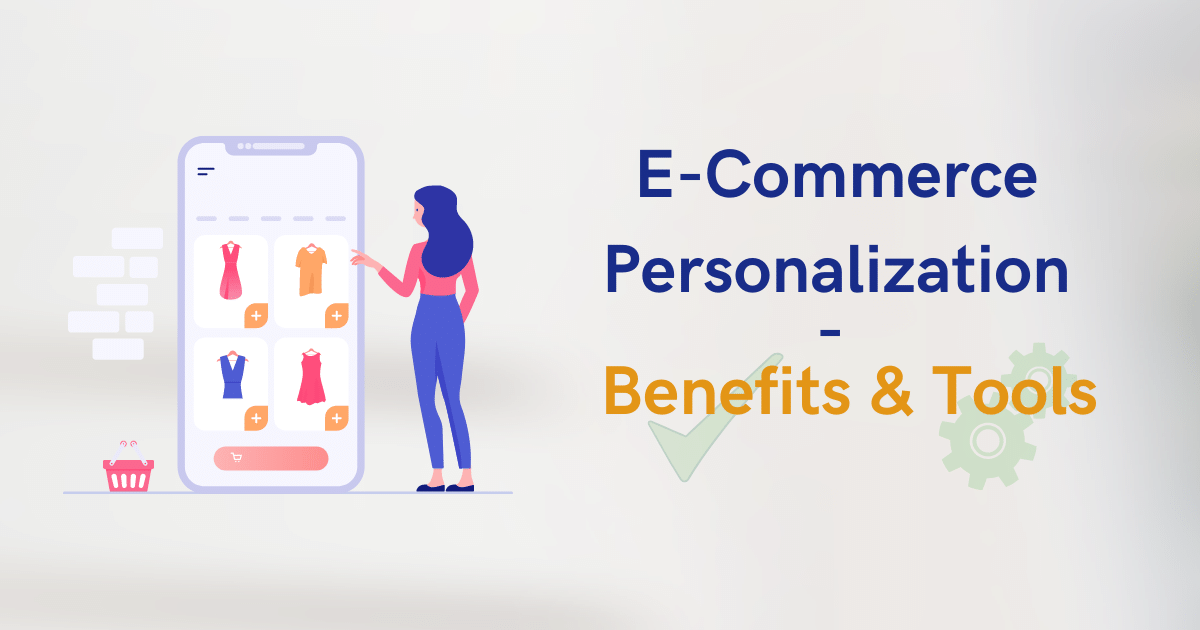
We bet you are tired of reading all those “best of” articles, but this one is really important.
How come?
It’s because eCommerce personalization efforts can boost your revenue by up to 15%.
Artificial Intelligence (AI) has substantially impacted eCommerce, enabling online stores to reach the audience in a customized manner. On the other hand, online businesses that fail to exploit advanced personalization tools will hardly keep pace with proactive competitors.
This is why you’ll find dozens of eCommerce personalization platforms on the Internet. All those Software-as-a-Service programs promise to take your business to a higher level. And most of them do it successfully.
But which one is the best?
It depends on your business needs, but we will explain why AX Semantics is the most valuable solution for most eCommerce stores. You will also learn about other interesting platforms with great personalization features.
Let’s take a look!
What is eCommerce personalization and how does it work?
eCommerce personalization represents the process of tailoring the online shopping experience for each customer. It sounds simple, but personalization in digital retail is an umbrella term that covers a wide range of functions. Some of them are:
- Personalized product recommendations: Your eCommerce personalization tool will analyze the browsing history of a website visitor to offer a relevant product.
- Targeted content: Different users look for different types of content. eCommerce personalization allows you to display the right piece of content to the right client.
- Tailored promo deals: Some online shoppers like free shipping, while others want VIP treatment or discounts. Your online store can create tailored promo deals based on customer data.
- Personalized emails: When you send cart abandonment emails, it’s best to write a unique message that can convince a recipient to go back and complete the purchase.
Online businesses can create a unique and engaging customer journey by providing a personalized shopping experience.
This strategy has an enormous business effect because 80% of consumers are more likely to purchase when brands offer personalized experiences. At the same time, studies reveal that over 70% of users express some level of frustration when their experience is impersonal.
In such circumstances, eCommerce personalization is not just an option anymore. It has become mandatory for online retailers who want to keep their stores up and running long-term.
Practical benefits of eCommerce personalization
You can already notice that eCommerce personalization has several practical benefits. But our job is to show that it has more advantages than you might have guessed at first. Here are the major pros of using personalization in online retail.
1. Higher user engagement and conversions
Website visitors are more likely to engage with your content and products if you provide them with personalized experiences. This means potential customers will spend more time on your website and probably explore some of your products.
The first result of user engagement is that your search engine ranking will be better—Google will recognize that visitors like spending time on your pages. Another consequence is even more important—your company will see an increase in conversions.
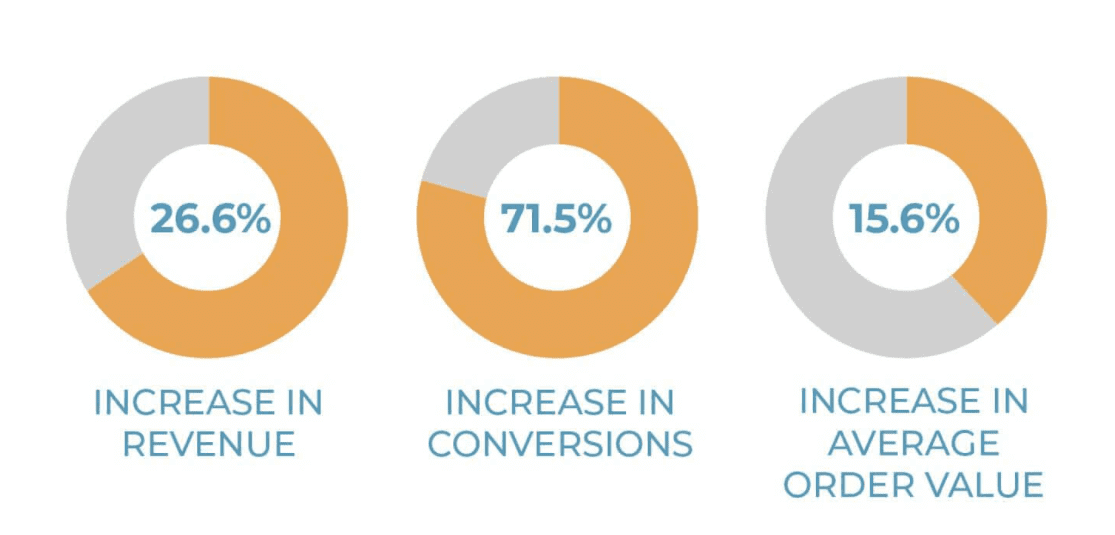
2. Customer loyalty will thrive
Another benefit of eCommerce personalization is that it drives customer loyalty. That’s because nearly 60% of customers stay loyal to brands that “get them.” Using a personalization platform makes it possible to enhance an entire customer journey and boost loyalty in the long run.
3. Shoppers will enjoy a better experience
Online stores relying on customer data for personalization will create a better shopping experience. As soon as you start using eCommerce personalization software, you will notice that your clients are more satisfied.
How come?
This happens because users get exactly what they want from your website. No matter what it is—a personalized product recommendation or a nice piece of content. A typical user will appreciate your efforts to enrich the customer journey.
4. Your revenue will grow
The ultimate goal of every business is to make a profit. With eCommerce personalization, you can count on a significant increase in revenue.
It’s a simple process: users spend more time on your eCommerce site, engage with your content, and end up purchasing more items than they used to. This is not possible if you don’t deliver personalized experiences.
Basic types of AI writing platforms
AI writing is a broad field that includes many variations, but we recognize two basic types.
Type 1 - GPT3:
The first type relies only on Deep Learning to generate content. GPT-3 utilizes Deep Learning to browse through millions of web pages so that they can discover meaningful content patterns. That way, the system can learn and create unique content on a given topic.
Type 2 - Data-to-text:
The second type of AI writing relies on Data-to-Text. In this case, the program doesn’t learn from third-party sources. It takes your data inputs instead to create fresh content.
AX Semantics uses Data-to-Text in the field of Natural Language Generation (NLG). This technology employs structured data to produce ready-to-use natural language content.
That makes this NLG field perfect for eCommerce companies needing targeted product descriptions and other types of data-sensitive content. It is precisely why online stores love AX Semantics.
How does it work?
AX Semantics enables online stores to automate content generation, particularly product descriptions. You can do it based on structured data from an external data source like a Product Information Management (PIM) system.
The best thing is that everything is available from your desk via your web browser. No programming skills are needed. Automated content creation with AX Semantics is a simple three-step process:
- Upload data: Use your PIM system or another source to upload data, such as product features and information. For instance, you can import data in a CSV file.
- Configure rules: You need to define the rules and the style our program will use to write product descriptions.
- Generate product descriptions: The third step is the simplest — just click the button, and AX Semantics will start writing thousands of individual texts for all of your data records.
The process is pretty straightforward, but AX Semantics still provides clients with an interactive eLearning course for easier onboarding.
Top 7 eCommerce personalization tools
We’ve spent a few months researching eCommerce personalization alternatives to come up with the best tools. Let’s see the top seven personalization platforms for online stores.
1. AX Semantics
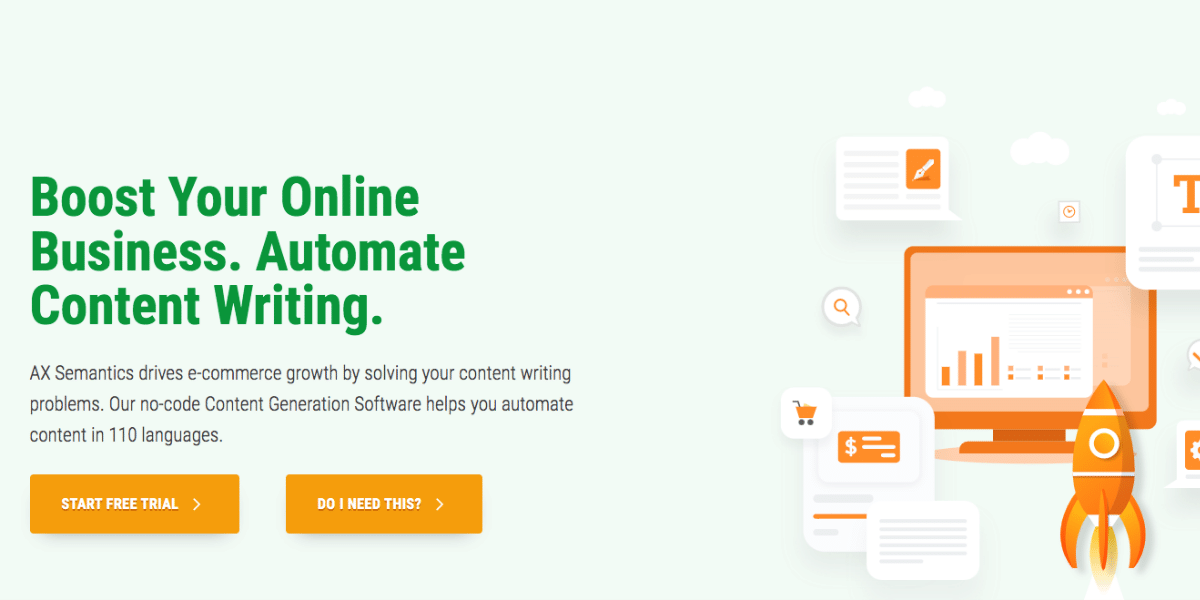
Yes, we are slightly biased—but that’s not why we put our tool at the top of the list. AX Semantics Personalized Commerce is the smartest eCommerce personalization tool for a variety of reasons.
When it comes to a detailed use case, our Personalized Commerce includes a simple five-step procedure:
- Data Gathering - you need to integrate the AX tracking snippet to your website, gathering real-time user-related behavioral data.
- Data Analysis - the next step is to analyze behavioral and psychographic data in our Metrics system. This is the basis to set specific writing goals for the content creation.
- Content Generation - it provides automated content personalization by leveraging behavioral data of the users. The platform creates content, such as automated product descriptions to fit each unique visitor.
- Display Content - The fourth stage is straightforward: you will be able to display customized content on your website. The text will appear in a slightly different format for each user.
- Performance Reporting and Analytics - finally, you may use reporting and analytics to measure the success of your website. You will immediately see improved search engine rankings and increased user engagement.
A huge advantage of AX Semantics is that it enables eCommerce personalization at scale. After the initial configuration, you don’t have to perform manual tasks anymore. That’s because the system learns about your products and users so that it can automate content generation swiftly.
The pros and cons of AX Semantics
AX Semantics is an all-encompassing platform, making it suitable for many online retail tasks. The system's main advantages include the following:
- Hyper-personalization: AX Semantics walks the extra mile to ensure hyper-personalization in eCommerce. The system relies on real-time data to display content that fits the preferences of a webpage visitor.
- SEO: AX Semantics writes content that is unique and optimized for engine searches. It will help your store rank higher by placing the right keywords all over the product page.
- Localization: A study shows that 90% of online shoppers use their native language if available. This is exactly why they’ll get it if you use AX Semantics because the system supports 110 languages.
- Customer support: It takes some time to get used to the program, but AX Semantics has a team of customer support agents ready to help you out.
- Data analysis: This program has a data collection and analysis feature called "Metrics". It’s a precious addition because you can track the progress of eCommerce personalization on the go.
- Integrations: You can completely automate data import to the AX NLG Cloud and content distribution to your CMS. This feature provides several options for entirely automating your workflows.
We can’t say that AX Semantics has any notable drawbacks, but we carefully listen to our clients to hear their opinions. We identified two little remarks:
- It requires a good database: It’s hard to make the most of AX Semantics if you don’t have a well-structured database. Your data sets must be neat and clean.
- Some users struggle with the setup: Users who are not tech-savvy may find the tool somewhat difficult at first. But it’s just the first impression—our clients say that the more you use it, the easier it becomes.
All in all, AX Semantics is the best platform for eCommerce companies eager to personalize their product pages. It will save you time and money while increasing conversions and customer satisfaction.
Take a look and watch the video on how automated content generation works.
2. Nosto
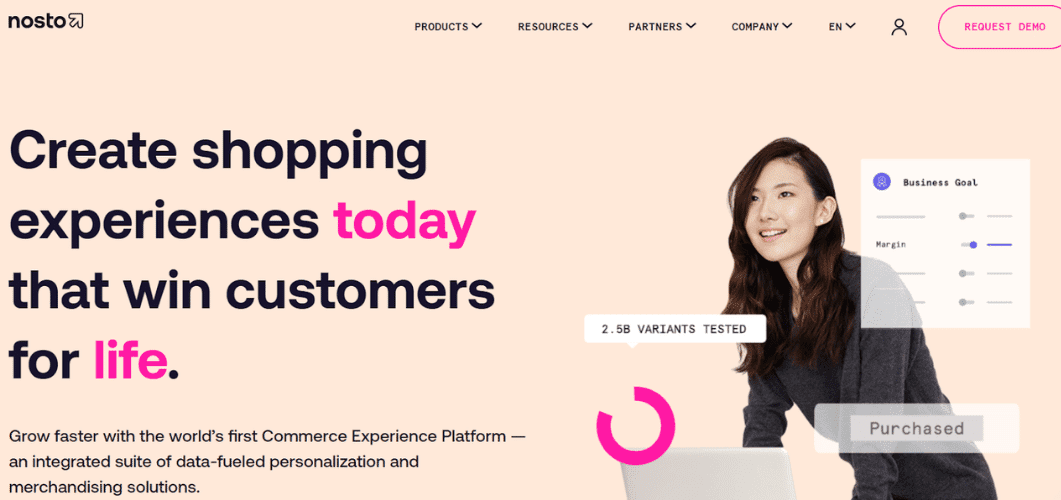
Number two on our list is Nosto, an omnichannel personalization tool for online retail companies. It uses customer-related information to provide tailored experiences across multiple communication channels, including product categories and email marketing.
The pros and cons of Nosto
Nosto covers many aspects of eCommerce shopping experiences, so it has a lot to offer. We will point out these features:
- Flexibility: The system is flexible enough to allow you to play with configurations. In other words, you can calibrate the platform to match user behavior and create a base of valuable customers.
- Omnichannel efficiency: Nosto can help you personalize everything from content and emails to mobile apps and pop-ups.
- A/B testing: Although not unique, this feature is very valuable. You can use A/B tests to gain insights into user behavior and learn more about your eCommerce business.
- It requires minimal intervention upon setup: When you set up and activate Nosto, you don’t need to do that much later. All it takes is to make minor adjustments.
Nosto is a handy tool, but it doesn’t come without a few downsides. Let’s check them out:
- A steep learning curve: We’ve seen more than one user review talking about the system's complexity. You need technical know-how to get it up and running.
- Price: The platform is not cheap, but it still requires extra payments for minor customization solutions.
- Poor localization abilities: Nosto will not suffice for international merchants with serious localization demands.
The bottom line is that Nosto represents a precious tool for eCommerce businesses with all-around personalization plans. However, it is not the best tool if you want to expand to international markets or work on a shoestring budget.
3. Personyze
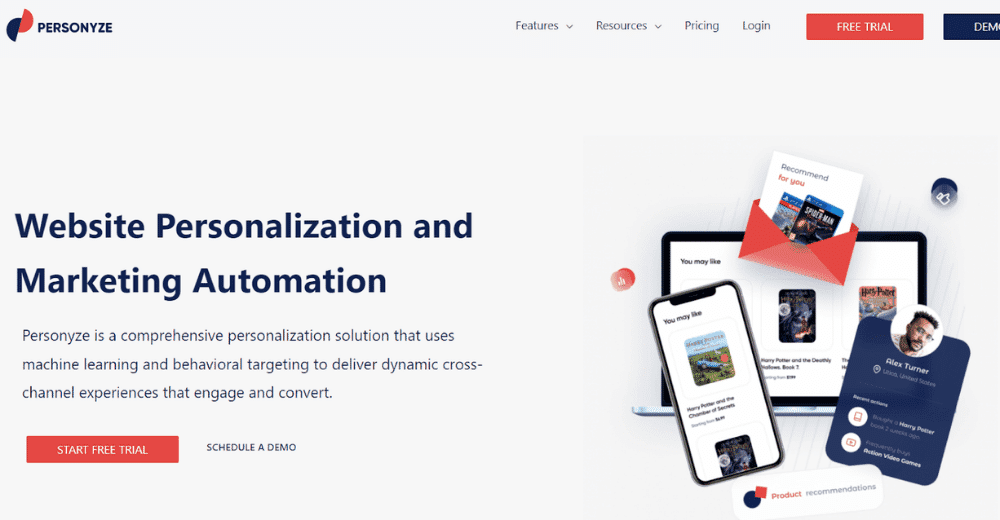
Personyze is another tool that can help you personalize an eCommerce site. This tool uses behavioral targeting to adjust every aspect of your online store and match the needs of individual consumers. The system is robust and offers you countless features.
The pros and cons of Personyze
Being such a comprehensive tool, Personyze gives eCommerce companies plenty of options to choose from. Here are the things we like the most:
- Dynamic landing pages: Personyze will assist you in crafting dynamic landing pages to serve individual users in real-time. That way, your website adapts to the profile of each visitor.
- Content personalization: Although not specifically designed for online retail, Personyze can tailor your content. That includes product recommendations, too.
- Email personalization: You can also customize email campaigns to suit the expectations of each subscriber.
On the other hand, Personyze has a few drawbacks as well. You should be aware of the following features:
- Complexity: The system contains so many features and options that it becomes challenging for most users.
- Poor reporting: Personyze could do a better job enabling more extensive reports. The current version of data analytics doesn’t provide users with too much sales-related data.
- Lazy user interface: Some clients believe that the user interface is a bit slow. It doesn’t make Personyze less functional, but it does interfere with most eCommerce professionals' usual pace of work.
Personyze is a reliable eCommerce personalization tool that you can use for content customization. If you don’t mind the hefty price tag, you will be happy with it.
4. OptinMonster
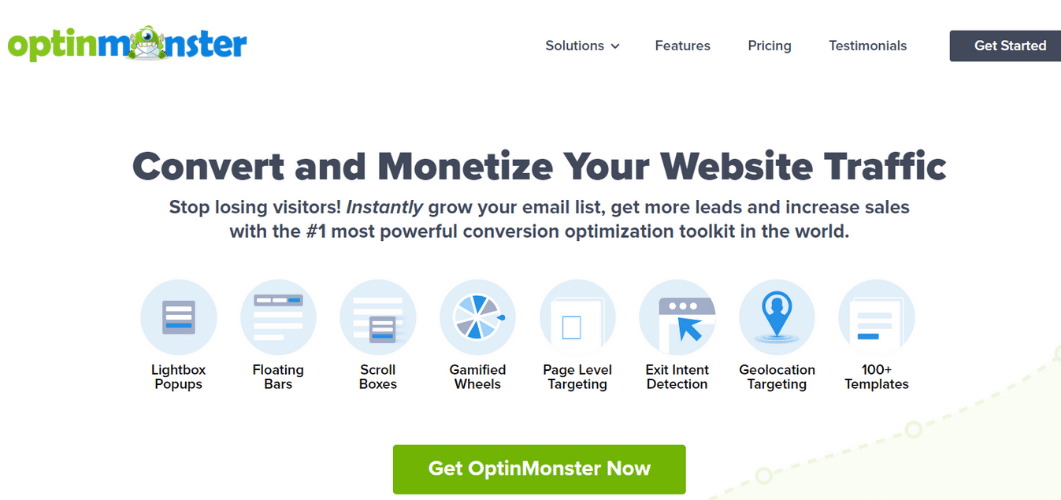
You probably know OptinMonster is one of the most popular website monetization tools, but it also serves as eCommerce personalization software. The main goals of OptinMonster are to help online stores reduce cart abandonment and increase sales conversions.
The pros and cons of OptinMonster
More than 500 thousand websites rely on OptinMonster, so it must contain quite a few features, right? Our job is to highlight the ones that matter the most to eCommerce companies.
- Readymade templates: The tool gives you dozens of readymade templates for welcome messages, exit-intent popups, etc. Although generic, these popups adjust to the needs of individual users based on their browsing behavior.
- Ease of use: OptinMonster is relatively easy to use, mainly if you know that it comes with many functions.
- Visual widgets: The system displays stunning visuals based on predetermined criteria and user-related information.
- Numerous integrations: It’s easy to connect OptinMonster with lots of third-party tools such as Mailchimp, WordPress, Google Analytics, and Sendinblue.
OptinMonster is great, but it’s not perfect. We can identify several details that eCommerce businesses won’t enjoy.
- Poor native analytics: The tool doesn’t tell you all that much. You can hardly find anything else but visitor numbers and conversion rates. You also need to evaluate individual campaigns as there is no universal analytics dashboard.
- Inert customer support: This issue probably has something to do with the sheer number of users. It often takes OptinMonster agents a while to get back to you.
- Pricing issues: Quite a few clients reported issues with pricing. It turns out they had to pay even for the services they hadn’t been using. This is very strange for a SaaS tool.
4. Clerk.io
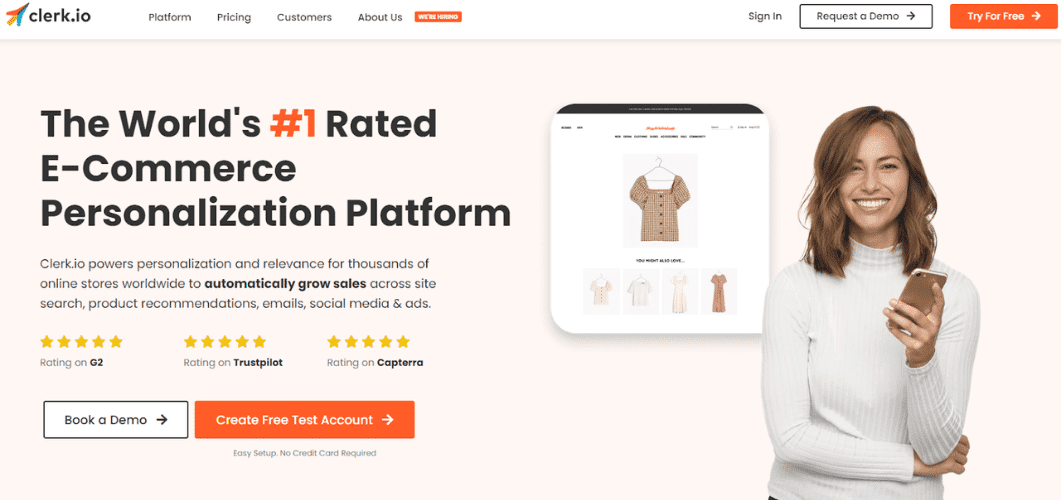
Clerk.io is the personalization tool that focuses on eCommerce businesses. It provides clients with powerful automation abilities to customize product recommendations, site search, and many other functions.
They recently included email personalization to the list, which added to the already strong and versatile portfolio.
The pros and cons of Clerk.io
Clerk.io is one of the leaders in the field of eCommerce personalization, so we can identify several benefits of using this platform.
- It’s a conversion booster: Personalized content you’ll get with this tool leads to a significant increase in conversions. Most user reviews explain how they improved sales with Clerk.io.
- Design: The tool creates nice visuals that help users understand what’s going on at any given point.
- Simple deployment: Although it takes a while to get used to Clerk.io, the platform is not as complex as others on our list.
- Diversity: Clerk.io is genuinely an omnichannel platform that can manage everything from product content to email communication. You will find it applicable to many fields of eCommerce business.
You’ve seen the pros of Clerk.io, but it’s fair to say that it has a couple of downsides. Here’s what we didn’t like about it.
- No real CRM integration: We’ve seen users complaining about the lack of real CRM solutions. This feature would help clients to understand customer behavior more accurately.
- Localization services can be better: Even though Clerk.io works in multiple languages, it can’t get anywhere near more advanced localization platforms such as AX Semantics.
- Pricing: A good tool deserves a reasonable price, but this one is just a little bit off the charts.
With Clerk.io, you get value for money. Although pricey, it’s an all-encompassing program with features that most eCommerce owners will appreciate.
6. Kibo Personalization
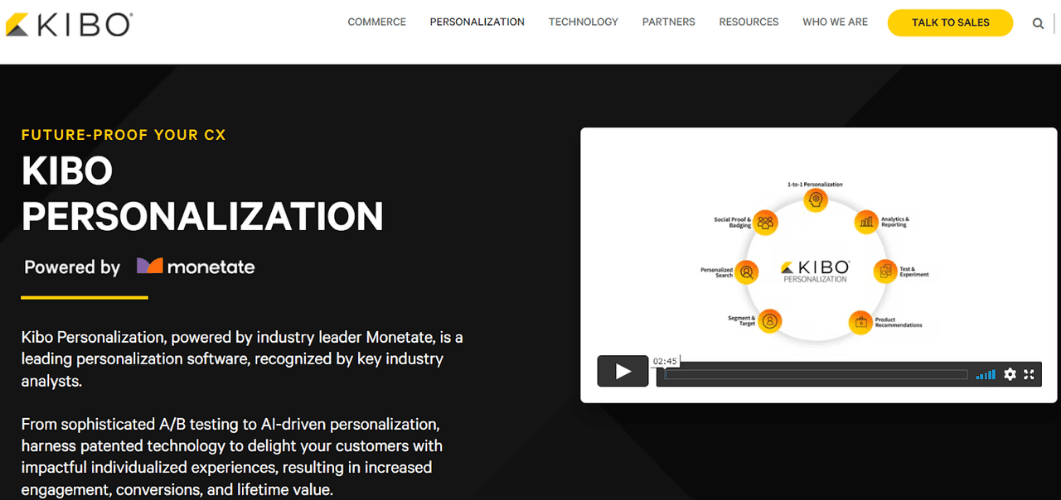
Kibo Personalization is a tool that helps businesses approach users as individuals rather than members of a larger customer group. This platform aims to increase engagement and customer lifetime value with AI-powered personalization.
Kibo supports multiple functions such as one-to-one personalization, testing, experimentation, personalized search, etc.
The pros and cons of Kibo Personalization
Like all tools on this list, Kibo Personalization has several practical benefits. We will stick to the pros that mean the most to eCommerce companies.
- Intuitive interface: We believe this is the biggest benefit of Kibo because its dashboard is neat and simple. Even beginner-level users won’t have a problem figuring it out.
- Dynamic testing: You can activate dynamic testing and let Kibo make a perfect mix of experimentation and control. That way, you can discover the right customer segments and identify new customers.
- Behavioral targets: The tool contains hundreds of behavioral targets that shed new light on your clients. Kibo Personalization allows you to build a base of repeat customers.
Kibo is not flawless, which means we have to point out the cons as well. The most notable drawbacks include:
- Product recommendations: More than one Kibo client claims that product recommendations don’t deliver as promised. That’s probably not the case with most users, but it does ruin the overall effect of eCommerce personalization.
- Built-in analytics is not great: You can find dozens of eCommerce personalization platforms with better built-in analytics.
- Inert customer support: Kibo’s customer support team is reportedly slower than expected.
All in all, Kibo is a friendly program for online retailers who need a reliable and user-friendly eCommerce personalization system.
7. Segmentify
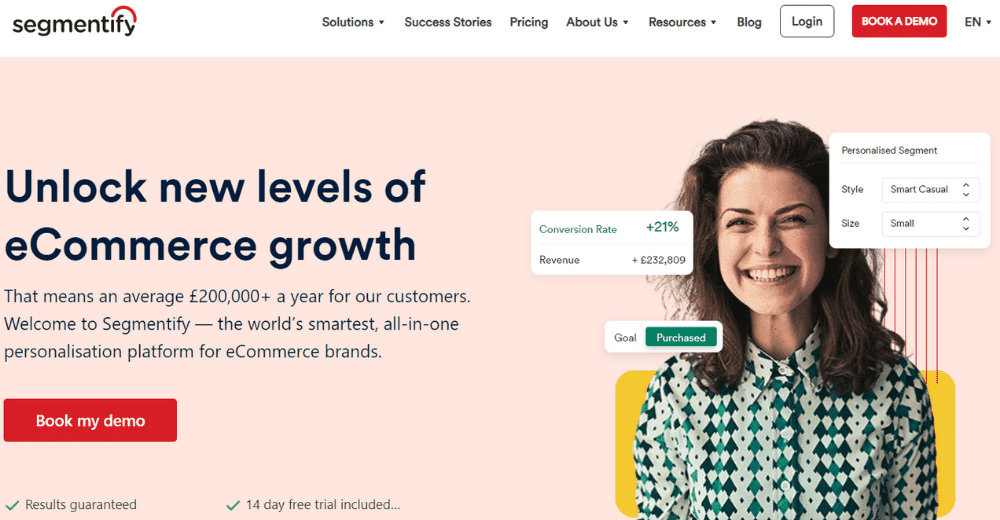
The last tool on our list is Segmentify. The system contains five major functions: personalized search, product recommendations, push notifications, behavioral targeting, and real-time conversion analytics.
We believe that most Segmentify features are valuable, but some of them stand out from the crowd. These are the ones we enjoyed the most:
- Personalized search: Instead of showing generic search results, Segmentify enables stores to display customized results based on previous user behavior.
- Recommendation tool: Website visitors can see a broad scope of personalized recommendations, not just top-selling products.
- Constant improvements: If you read user reviews, you’ll notice that many clients praise Segmentify for continuously adding new functions to the system.
As you already know, we need to discuss a few negative aspects as well. This is what we don’t like about Segmentify:
- No Google Analytics integration: Website owners who want to check the results with a third-party tool like Google Analytics will just have to trust Segmentify.
- Occasional push notification issues: Sometimes, it’s hard to control push notifications and edit them within the draft folder.
- Widgets tend to go down: Segmentify widgets can break from time to time, but the system usually restores them quickly.
The bottom line is that Segmentify makes a fine tool for eCommerce personalization. It may not be the most comprehensive option, but it will rarely let you down.
Comparison table: Best eCommerce personalization software
Some people like to compare and visualize the advantages of eCommerce personalization tools. That’s why we prepared a comparison table to make it more understandable.
We rated each tool (high, medium, or low) according to the most critical features of eCommerce personalization.
| AX Semantics | Nosto | Personyze | OptinMonster | Clerk.io | Kibo Personalization | Segmentify | |
| Automation | High | High | High | High | High | High | High |
| Localization | High | Low | Medium | High | Medium | Medium | Low |
| SEO | High | High | High | High | Medium | Medium | High |
| Ease of use | Medium | Low | Low | High | High | High | High |
| Data analytics | High | High | Medium | Medium | High | High | Medium |
| Customer service | High | High | High | Medium | High | Medium | High |
How to pick the right eCommerce personalization software
Perhaps you don’t like our suggestions, and that’s fine. We are still here to give you many useful tips on picking the right eCommerce personalization tool for your online store. Here’s how you can find a good platform:
1. Make sure it’s user-friendly
An eCommerce personalization program must help you so you can help your customers. The platform must be intuitive, allowing you to access important features in a click or two. Besides that, it should have an easy to medium learning curve for new users.
2. Automation potential
The best personalization tools in online retail enable you to automate most processes. As soon as you set it up, the program should be able to take over and perform repetitive tasks.
That’s why automated content generation is one of the most important eCommerce automation trends.
For instance, AX Semantics recognizes different product types. It can automatically create multiple product descriptions within the same group after your initial configuration. You don’t need to calibrate it for each item separately—the system does it on its own.
3. Check for third-party integrations
Even the most powerful eCommerce personalization software can’t do everything alone. You need a tool with lots of relevant third-party integrations to support your online store.
Third-party integrations are precious because they help your business save time, reduce operating costs, and combine multiple features simultaneously. As an eCommerce business, you will probably need integrations with tools like Shopify, Magento, Salesforce, Zapier, etc.
4. Powerful data analytics
You don’t know that your eCommerce personalization tool is working if you don’t keep track of your results. A reliable platform will provide online stores with numerous insights like:
- Engagement rates
- Customer lifetime value
- Campaign performance
- Conversion rates
These and many other stats will confirm that your business is progressing thanks to eCommerce personalization.
5. Knowledgeable customer service
Sooner or later, you’ll bump into minor issues with every AI-powered tool. The difference between good and bad SaaS platforms is that the former have knowledgeable customer service representatives to help you out. That way, you can solve problems quickly and prevent further damage.
Conclusion
The Internet is packed with excellent eCommerce personalization tools. Almost any platform you choose will help you improve customer experience - at least to some degree.
But you should know that the devil is in the details.
Even a minor issue can cause major problems along the way, so you don’t want anything but perfection. This is exactly why we encourage you to try AX Semantics.
Our tool will cover several aspects of eCommerce personalization for you. Even better, the program will automate processes and set you free from repetitive tasks. It will save you a lot of time, money, and nerves in the long run. Most importantly, it will boost your revenue.
Are you ready to give it a try?
FAQ
One of the best examples of eCommerce personalization comes from AX Semantics and our cooperation with the Otto Group. This is one of the largest online stores in Germany and a globally active group of retailers.
With thousands of products in its portfolio, the Otto Group needed a scalable content solution. AX Semantics stepped in to generate high-quality product descriptions by configuring the content, wording, tonality, and structure individually.
We didn’t only automate content production but also added season-specific content into product descriptions where applicable. That way, the Otto Group generated more than 100 thousand personalized product pages that perfectly suit user-related information.
eCommerce personalization is crucial because it allows businesses to provide a unique and targeted experience for their customers. Online stores can tailor their products, services, and overall online experience by understanding the customer's needs and preferences.
This helps build customer loyalty and increases sales over time. It also helps you grow the average order value.
Most eCommerce merchants struggle with personalization because they still don’t use AI-powered personalization tools. Companies that fail to invest in automation programs can’t cope with large datasets manually.
They lack customer analytics and data-driven insights, so they end up providing eCommerce website visitors with generic and impersonal content.
Saim Alkan
Saim Rolf Alkan is Chief Executive Officer at AX Semantics and a pioneer in the field of automated content generation. After successfully working in content for years, he decided that businesses needed a better tool: one that would allow man and machine to work together to produce the volume of content needed to thrive in the digital age. Saim developed a content solution that generates high-quality texts from data in 110 languages for use in industries including e-commerce, publishing and finance. He is also a lecturer and speaker in the fields of online communication and "robot journalism" and has written several books and numerous articles.

